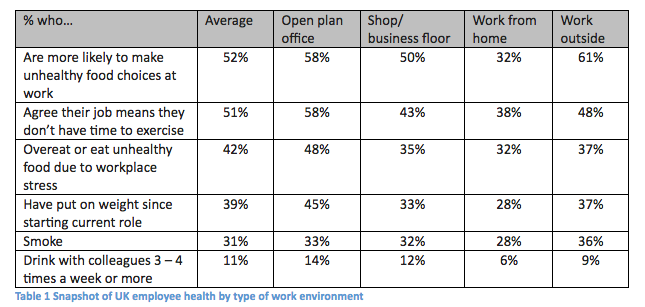Staff in open plan offices are most likely to have poor health habits linked to cancer risk, with smoking, alcohol consumption, weight gain and a lack of exercise all linked to workplace environmental factors, new research suggests.
Employees in open plan offices are more likely to have put on weight since starting their current role, with 45 per cent of open plan office workers having done so. That compares to an average of 39 per cent across all work environments and just 28 per cent amongst those who work from home, a survey of 1,006 employees conducted by Canada Life Group Insurance has found. People who work from home are less likely to have poor health habits that increase the risk of cancer.
Meanwhile research from Axa PPP shows UK workers who sit for some or most of their working day are piling up an average daily sit-time of nine hours. The poll of 2,000 workers found that, while 46 per cent sit at work for 4 to 6 hours per day, 25 per cent notch up 7 to 8 hours daily. Sitting eats into people’s travel time too, with 29 per cent seat-bound for up to half an hour as a part of their daily commute to and from work and 27 per cent occupying a travel-time seat for 30 to 60 minutes. Seventeen per cent say their seated commuting time takes 1 to 2 hours.
The Canada Life research found third – 33 per cent – of open plan office workers smoke, compared to 28 per cent of those who work from home.
 Two in five – 42 per cent – of UK employees overeat or eat unhealthily due to workplace stress – rising to 48 per cent of open plan office workers, while 27 per cent don’t use their lunch hour to exercise because their boss or colleagues wouldn’t approve.
Two in five – 42 per cent – of UK employees overeat or eat unhealthily due to workplace stress – rising to 48 per cent of open plan office workers, while 27 per cent don’t use their lunch hour to exercise because their boss or colleagues wouldn’t approve.
The research asked staff in different work environments about their diet, weight, exercise, smoking and drinking habits while at work. Overall, those working in open plan offices are most likely to have the unhealthiest habits, increasing their risk of one day developing cancer. In contrast, those who work at home are on average least likely to have these unhealthy habits, demonstrating the strong influence workplace environment has on key areas of health.
 Cancer accounts for 69 per cent of critical illness insurance claims.
Cancer accounts for 69 per cent of critical illness insurance claims.
Among all UK employees, only 38 per cent exercise four to six times a week or more – the amount needed to reach NHS recommended exercise guidelines. Those who work from home are most likely to exercise this amount, with 43 per cent doing so, due to having more flexibility in how they structure their working day. In contrast, only 37 per cent of open plan office workers reach this target.
Canada Life Group Insurance marketing director Paul Avis says: “Half of us will get cancer at some stage in our lives, and this disease is by far the most common critical illness claim we receive. With employees spending the majority of their week at work, the habits we develop in the workplace can have a real impact on our long-term health. Although this is partly down to workers’ own health choices, our research reveals some workplace environments are more likely to cultivate behaviours with real health risk implications than others.
“Employers can alleviate the issue of poor workplace health by communicating positive health and wellbeing messages to staff. Employee Assistance Programmes (EAPs), such as those included alongside most group income protection products, are a vital tool in maintaining a healthy workforce. These services can help promote healthy actions and support employees should their wellbeing begin to suffer. All employers have a duty of care towards their employees, and regularly communicating the importance of health and wellbeing will result in a happier, and ultimately more productive, workforce.”
Axa PPP Healthcare head of musculoskeletal services Jan Vickery says: “We cannot escape from the fact that many of us do much of our day-to-day business on our bottoms. To help bring this home, this nine-hour sit-time is tantamount to a UK flight to the Caribbean and, while it’s encouraging that some people are taking steps to lower the risks associated with prolonged sitting, it’s a concern that, for others, this seems to be a low priority. To make matters worse, sedentary home and leisure patterns may further increase our susceptibility to chronic health problems.
“For the sake of our health we need to break the sedentary cycle. Employees – and their employers – should be aware that adopting and developing better habits can make a big difference. Making a point of getting up and about every half hour – whether to speak with a colleague or just to stretch your legs – should help you to feel more energised and productive. Perhaps it’s time to give that old exhortation ‘Bottoms up’ a new lease of life to remind ourselves to get up and off our chairs more often.”





